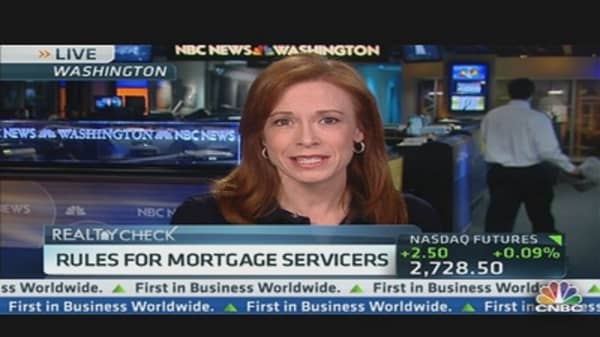Just one week after it laid out new rules for mortgage lending, the Consumer Financial Protection Bureau is now targeting mortgage servicers, the companies that process your monthly payments and come after you when you don't pay.
The nation's five largest banks service about half of all mortgages, but recently they have been selling those servicing rights to so-called "specialty servicers," like Ocwen and Nationstar, whose stocks have been soaring. These companies specialize in delinquent mortgages.
The new rules could make mortgage servicing more expensive, especially for those specialty servicers and level the playing field between them and the big bank servicers. That is because many of the new rules are similar to rules the big banks are already following under the $25 billion servicing settlement signed early last year with state attorneys general and the Department of Justice over "robo-signing" foreclosure abuses. The specialty servicers have no such mandates.
(Read More: Homeowners With No Mortgage Offer Recovery Clues)
"If you're a good servicer who's been doing sensible things, this will probably be about what you are doing now, just with a heavier enforcement regime behind it," said CFPB Director Richard Cordray. "For servicers that have been doing a poor job, and many of them have, they will have to change their processes and get in line."
The new rules include some very basic service standards, like clear monthly statements, prompt payment crediting and quick correction of errors; In other words, common sense that one might not expect to see mandated by a federal regulator.
"This shows just how poorly performing the mortgage servicing industry was before the crisis, and then as volumes increased in delinquencies during the crisis, it all exponentially worsened," said Cordray.
(Read More: US Home Prices Surge Despite Distress)
Most of the rules focus on those delinquencies. First, and perhaps foremost, servicers may not move forward with a foreclosure while simultaneously working with a borrower to avoid foreclosure. This "dual tracking" led to thousands of borrowers losing their homes when alternatives were well within reach.
"For servicers that have been doing a poor job, and many of them have, they will have to change their processes and get in line"
The rules also require servicers to look at all foreclosure alternatives, alert borrowers to those alternatives in writing as well as provide "easy, ongoing access to employees responsible for helping" borrowers. Servicers may not steer borrowers to options that are most favorable financially to the servicer.
The rules do not go into effect until January of 2014. The five big banks that signed last year's mortgage servicing settlement (Ally/GMAC, Bank of America, Citi, JPMorgan Chase, and Wells Fargo) have nearly completed their financial commitments under the deal, and some have been selling mortgage servicing rights. That makes the need for these rules ever more urgent.
"These are mandatory rules, it's now law. People will be obliged to follow them," warned Cordray.
(Read More: Why Big Houses Are Coming Back )
—By CNBC's Diana Olick; Follow her on Twitter @Diana_Olick or on Facebook at facebook.com/DianaOlickCNBC
Questions? Comments? RealtyCheck@cnbc.com




